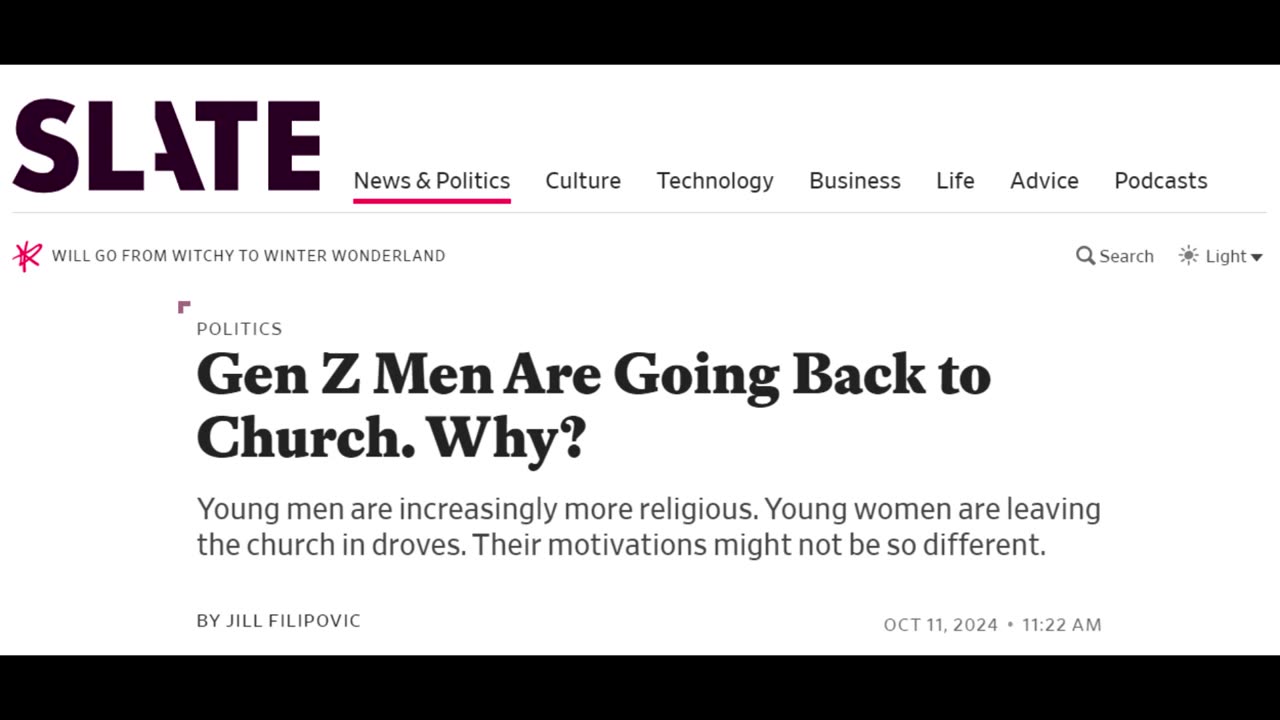Premium Only Content

Why Gen Z Is Becoming Religious (Audio Only) ft. Gen Z Christianity — Daily Persuasion Ep. 31
Would you like to write a persuasive BOOK? One that changes minds and influencers behavior for years to come? Start with a GOLDEN book idea. Let NEW YORK TIMES bestselling author Joshua Lisec teach you: https://lisecghostwriting.com/golden
ABOUT TODAY'S EPISODE:
Is Gen Z becoming more religious — or simply becoming more human again?
In Episode 31 of Daily Persuasion, titled “Why Gen Z Is Becoming Religious (Audio Only) ft. Gen Z Christianity,” Joshua Lisec unpacks the growing trend that the mainstream media only scratches the surface of: Gen Z men are going back to church. But why?
Drawing from an incisive critique of Jill Filipovic’s recent Slate article on the topic, Lisec explores the real reason Gen Z religious demographics are shifting — and what it reveals about the deeper nature of humanity, faith, and identity in an era of collapsing institutions and ideological fatigue. Filipovic’s piece suggests a cultural swing, but Lisec suggests something more primal: a return to what works — biologically, psychologically, and spiritually.
In this episode, Lisec leans into a natural history of religion, asking not just is Gen Z religious — but why? Why is Gen Z Christianity on the rise? Why are so many young men and women not just becoming Christian, but becoming Catholic, Orthodox, or Latter-day Saints — faiths marked by ritual, reproduction, and retention?
As Joshua Lisec argues with clarity and conviction, this generation has seen the fruit of godless ideologies: nihilism, identity confusion, collapsing birthrates, and mental health epidemics. Gen Z church attendance isn’t a regression — it’s a rebellion against the cult of secular scientism and the empty promises of woke capitalism and progressivism. In one of the most compelling persuasion examples in recent memory, the facts speak for themselves: the faiths that ask more of their members are the ones retaining them.
From an anthropological lens, Lisec explains how human reproduction and religious practice are biologically entangled. A fish doesn't need to believe in water to swim — likewise, humanity doesn’t need to be told to worship. It’s in our natural history of religion. That’s why gen z religious demographics reveal what many secular thinkers miss: these young people aren’t blindly obeying — they’re consciously choosing what works. They’ve weighed the outcomes and rejected spiritual minimalism.
Lisec backs his persuasion techniques with evolutionary insights and cold demographic data. In a world where persuasive techniques often aim to manipulate, he demonstrates how to persuade someone to do something with truth, story, and evidence. This is persuasion psychology at its most intellectually honest — a far cry from shallow examples of persuasion in advertising.
Not content to rely on surface-level analysis, Lisec invites listeners to go deeper. This episode draws from his powerful essay “A Natural History of Christianity,” which connects prehistoric talismans to today’s most successful Christian traditions. Through this, Lisec shows that religion is not a cultural artifact — it’s a human survival mechanism. The most enduring faiths survive because they align with human biology and family structure. This is evolution. This is Daily Persuasion.
Is Gen Z becoming more religious? The answer is yes — and it’s a profoundly rational response. They’re becoming Christian not out of nostalgia, but because they’ve seen what doesn’t work. They are becoming Catholic not to cling to the past, but to secure a future.
In a media landscape where few ask the right questions, Lisec doesn’t just explain what’s happening — he reveals the why behind the how. This is Gen Z Christianity not as a trend, but as a tectonic shift. This is what happens when the truth is more persuasive than the narrative.
🔊 Listen to Episode 31 of Daily Persuasion now: Why Gen Z Is Becoming Religious (Audio Only) ft. Gen Z Christianity.
Welcome to the return of faith. Welcome to the age of biological belief.
-
 2:36
2:36
Daily Persuasion with Joshua Lisec
12 days agoMultisensory Persuasion Demonstration — Daily Persuasion with Joshua Lisec Ep. 305
231 -
 1:51:40
1:51:40
Nerdrotic
6 hours ago $0.45 earnedGobekli Tepe Discovery and "Reconstruction" | Forbidden Frontier #118
58.2K6 -
 29:07
29:07
Tactical Advisor
6 hours agoATF Changes Ruling on SBR & Tacpack unboxing | Vault Room Live Stream 039
56.7K14 -
 2:00
2:00
From Zero → Viral with AI
12 hours ago $0.73 earnedAre You Being Left Behind? Why AI Marketing is No Longer Optional
26.9K3 -
 9:10
9:10
BlackDiamondGunsandGear
10 hours agoI Finally Got it! / Now i need to BUILD IT!
19.5K6 -
 9:44
9:44
Millionaire Mentor
3 days agoCharlie Kirk Brings Woke Student To STUTTERING Over White Privilege Lies
24.1K7 -
 24:12
24:12
MudandMunitions
11 hours agoOff-Roading with NYPrepper Wild Elk & PA’s Most Remote Backroads
13.9K1 -
 DVR
DVR
Bannons War Room
7 months agoWarRoom Live
37.4M8.69K -
 3:13:07
3:13:07
IsaiahLCarter
10 hours ago $0.75 earnedAPOSTATE RADIO 029: Leftist Violence, & NYC's Mayor's Race (Guests: Lattina Brown and David Sivella)
14.4K -
 10:03:41
10:03:41
LFA TV
17 hours agoLIVE: CHARLIE KIRK VIGIL SERVICE!
178K65